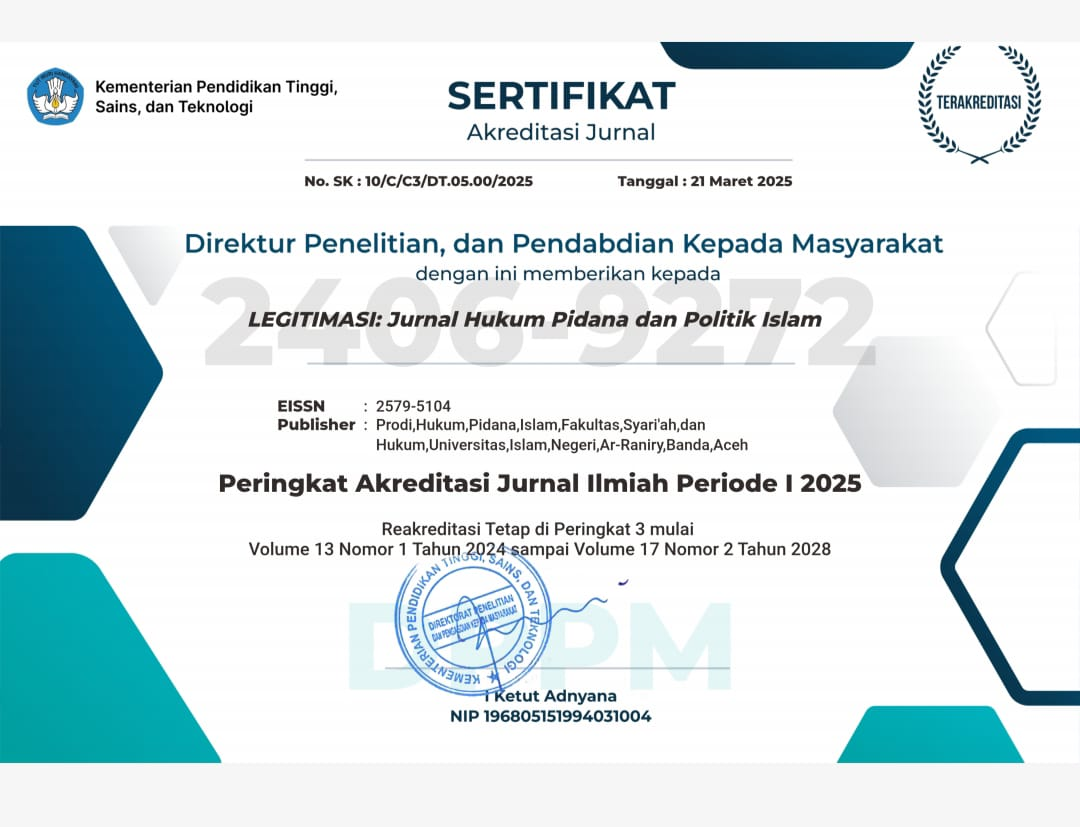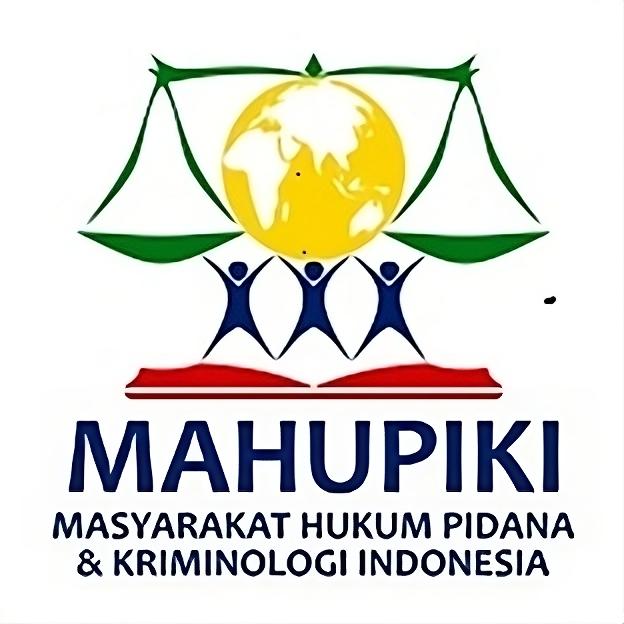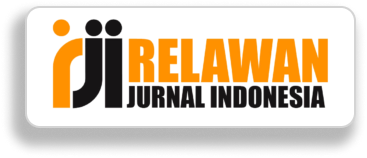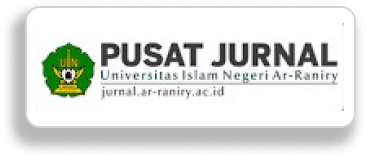The Supervisory System of Conventional Online Lending in Aceh Following the Enforcement of Qanun Number 11 of 2018: A Study on Criminal Elements in Online Lending Transactions
DOI:
https://doi.org/10.22373/legitimasi.v14i1.30033Keywords:
Supervisory System, Online Lending, Qanun Number 11 of 2018Abstract
Online Service lending has become a widely used financial product due to its accessibility, including in Aceh, which has implemented Qanun Number 11 of 2018 concerning Islamic Financial Institutions that prohibits interest-based lending practices. Therefore, this study focuses on the supervision of conventional online lending conducted by the government in Aceh following the implementation of Qanun Number 11 of 2018. This research adopts a descriptive method with data collected through interviews. The findings indicate that, to date, conventional online service lending (pinjol) operations in Aceh remain unrestricted, with no limitations imposed on their activities. In Aceh, stakeholders have yet to take concrete measures to curb or prohibit conventional online lending practices. Consequently, many consumers in Aceh, including educated individuals such as teachers and students, as well as the general public, have been trapped in debt and faced payment defaults. Therefore, strategic actions are required from both the Aceh government and religious scholars (ulama) to collaborate and synergize with relevant institutions such as the Financial Services Authority and Bank Indonesia to curb conventional fintech practices in Aceh, in accordance with the provisions outlined in Qanun Number 11 of 2018 on Sharia Financial Institutions in Aceh
References
Arifin, Zainul. Dasar-Dasar Manajemen Bank Syariah. Jakarta: Alvabet, 2006.
Barone, Raffaella, and Donato Masciandaro. “Cryptocurrency or Usury? Crime and Alternative Money Laundering Techniques.” European Journal of Law and Economics 47, no. 2 (2019).
Beebeejaun, Ambareen. “Privacy Laws in The Context of Fintech Industry in Mauritius: A Comparative Study.” International Journal of Law, Humanities & Social Science 3, no. 3 (2019).
Dewi, I. G. A. A. O., & Dewi, I. G. A. A. P. “Corporate social Responsibility, Green Banking, and Going Concern on Banking Company in Indonesia Stock Exchange.” International journal of social sciences and humanities, 1(3), (2017).
Ferreira, Marcos Alan, and Anna Beatriz Gonçalves. “Criminal Governance and Systems of Parallel Justice: Practice and Implications in Brazilian Urban Peripheries.” International Journal of Law, Crime and Justice 68 (2022).
Gandapradja, Permadi. Dasar dan Prinsip Pengawasan Bank. Jakarta: Gramedia Pustaka Utama, 2004.
Gunawan, I. Upaya Preventif dan Represif dalam Penanggulangan Kebocoran Data Pada Penyelenggaraan Pinjaman Online. Jurnal Officium Notarium, (2024).
H. C. Pratiwi. Analisis Faktor-Faktor yang Mempengaruhi Keputusan Pemberian Pembiayaan UMKM Pada Lembaga Keuangan Mikro Pinjaman Online. (Doctoral dissertation, Universitas Muhammadiyah Yogyakarta).
Hikmawati, P. Implementation of Criminal Law In Handling Illegal Online Lenders Cases. Info Singkat: A Brief Stusy of Actual and Strategy Issues 9, no. 17, (2021): 1–6.
Huang, Li, and Henry N. Pontell. “Crime and Crisis in China’s P2P Online Lending Market: A Comparative Analysis of Fraud.” Crime, Law and Social Change 79, no. 4 (2023).
Imanuddin, I., Dewi Anggraeni, R. R., Fridayani, & Susanto. Construction of Consumer Protection Against Illegal Online Loan Transactions as a Means of IUS Constituendum in Indonesia. Jurnal IUS Kajian Hukum Dan Keadilan 11, no. 3 (2023): 539–556.
Iskandar, E., Ayumiati, A., & Katrin, N. “Analisis Prosedur Pembiayaan dan Manajemen Risiko pada Perusahaan Peer to Peer (P2p) Lending Syariah di Indonesia.”J-ISCAN: Journal of Islamic Accounting Research 1, no. 2 (2019).
Kadarisman, M. Manajemen Pengembangan Sumber Daya Manusia. Jakarta: Rajawali, 2013.
Karo, R. P. P. K. Borrower’s Right to a Sense of Security in Illegal Peer to Peer Lending in Indonesia Perspective of Dignified Justice Theory. Journal of Legal, Ethical and Regulatory Issues 25, no. 4 (2022): 1–10.
Kartika, R. “Analisis Pinjaman Online di Indonesia. “Akuntabilitas: Jurnal Ilmiah Ilmu-Ilmu Ekonomi 12, no. 2 (2019).
Li, Dongmei, Zhe Peng, and Kainan Xiong. “Usury Crimes in Post-Crisis China: The Underlying Economics and Beyond.” Journal of Economic Issues 55, no. 4 (2021).
Miftahuddin. “Perbandingan Konsep Keuangan pada Bank Syariah dan BankKonvensional.” Journal of Education, Humaniora and Social Sciences (JEHSS) 2, no. 2 (2019).
Muganyi, Tadiwanashe, Linnan Yan, Yingkai Yin, Huaping Sun, Xiangbin Gong, and Farhad Taghizadeh-Hesary. “Fintech, Regtech, and Financial Development: Evidence from China.” Financial Innovation 8, no. 1 (2022).
Muryanto, Yudho Taruno. “The Urgency of Sharia Compliance Regulations for Islamic Fintechs: A Comparative Study of Indonesia, Malaysia and the United Kingdom.” Journal of Financial Crime 30, no. 5 (2023).
Muryanto, Yudho Taruno, Dona Budi Kharisma, and Anjar Sri Ciptorukmi Nugraheni. “Prospects and Challenges of Islamic Fintech in Indonesia: A Legal Viewpoint.” International Journal of Law and Management 64, no. 2 (2022).
Musjtari, Dewi Nurul, Fiska Silvia Raden Roro, and Ro’fah Setyowati. “Islamic P2p Lending As An Alternative Solution for The Unfair Conventional Platform In Indonesia.” UUM Journal of Legal Studies 13, no. 1 (2022).
Nagimova, Almira Z. “Islamic Fintech: Digitalization Of Global Islamic Finance.” World Economy and International Relations 66, no. 5 (2022).
Nguyen, Oanh Van, Cong Van Lai, Hai Thanh Luong, and Toan Quang Le. “Exploring Loan Sharks in Online Peer-to-Peer Lending Applications: A Case Study of Vietnam.” International Journal of Criminology and Sociology 10 (2021).
Pager, Devah, Rebecca Goldstein, Helen Ho, and Bruce Western. “Criminalizing Poverty: The Consequences of Court Fees in a Randomized Experiment.” American Sociological Review 87, no. 3 (2022).
Payne, Allison Ann, Kelly Welch, Chiara Natalie Focacci, Mitja Kovac, Rok Spruk, Gabriele Camera, Alessandro Gioffré, et al. “2 - A Brief History of Restorative Justice.” International Journal of Law, Crime and Justice 9, no. 1 (2023).
Refgiani, Devika and Suherman Rosyidi. “Efektivitas Pengawasan Penerapan Prinsip Syariah Oleh Dewan Pengawas Syariah (DPS) (Studi Kasus PADA PT. BPRS Amanah Sejahtera).” Jurnal Ekonomi Syariah Teori dan Terapan 3, no. 9 (2016).
Savitri, A., Syahputra, A., Hayati, H., & Rofizar, D. H. “Analisis Pengaruh Kualitas Pelayanan Terhadap Kepuasan Pelanggan.” Jurnal Ekonomi Manajemen Dan Bisnis 22, no. 2 (2021).
Sondole, Erlis Milta Rin. dkk. “Pengaruh Disiplin Kerja, Motivasi dan Pengawasan terhadap Kinerja Karyawan pada PT. Pertamina (Persero) Unit Pemasaran VII Pertamina BBM Bitung.” Jurnal EMBA, 3 (2015).
Supriyanto, S., Fachrudin, K., Octavianus, H., Meliza, J., Hastalona, D., & Taslim. “T. Indeks Malmquist: Studi Literatur dan Kajian Kinerja Perbankan Syariah.” Journal of Education, Humaniora and Social Sciences (JEHSS) 4, no. 2 (2021).
Supriyanto, Supriyanto. “Financial Technology Application Challenges: Victims of Online Loan Bondage (Peer-to-Peer Lending) Protection.” International Journal of Social Science and Human Research 6, no. 10 (2023).
Tsuroyya, D.& Muzayyanah, M. “Analisis Pelaksanaan Musyarakah Pada Layanan Financial Technology Pinjaman online Syariah di Indonesia (Studi Pt Syarfi Teknologi Indonesia).” Jurnal Al-Mizan Jurnal Hukum dan Ekonomi Islam, 3, no. 2 (2019).
Wang, P., Zheng, H., Chen, D., & Ding, L. Exploring the critical factors influencing online lending intentions. Financial Innovation 1, no. 1 (2015).
Winarso, T., Disemadi, H. S., & Prananingtyas, P. “Protection of Private Data Consumers Pinjaman online As Part of E-Commerce Business in Indonesia.” Tadulako Law Review 5, no. 2 (2020).
Yunianto, W. A., Astutik, S., & Handayati, N. Analisis Yuridis Terhadap Tindak Pidana Yang Dilakukan oleh Penyedia Aplikasi Pinjaman Online Ilegal. Indonesia Journal of Business Law 4, no. 1 (2025).
Wang, Peng, and Georgios A. Antonopoulos. “Organized Crime and Illegal Gambling: How Do Illegal Gambling Enterprises Respond to the Challenges Posed by Their Illegality in China?” Australian and New Zealand Journal of Criminology 49, no. 2 (2016).
Wang, Peng, Mei Su, and Jingyi Wang. “Organized Crime in Cyberspace: How Traditional Organized Criminal Groups Exploit the Online Peer-to-Peer Lending Market in China.” British Journal of Criminology 61, no. 2 (2021).
Xiong, Jianying, Min Tu, and Ying Zhou. “Using Weighted Similarity to Assess Risk of Illegal Fund Raising in Online P2P Lending.” International Journal of Digital Crime and Forensics 10, no. 4 (2018).
Interview:
Interview with Shabarullah, Islamic Economics Observer, 2023
Interview with Mujiburrahman, Aceh Police cyber team, 2024.
Interview with Rivaldi, Head of Cyber Crime Division of Aceh Police, 2024
Interview with Kamal, Aceh Police cyber team in Lamreung, July 10, 2024
Interview with Deni Candra, Head of LPOM MPU Aceh, at the MPU Aceh office. 2024
Interview with Sarah, OJK Aceh Staff at the OJK Branch Office, 2024
Interview with Rahmat, a user of online loan services
Statute:
Qanun of Aceh Province Number 11 of 2018 Concerning Islamic Financial Institutions
PJOK Number 10/POJK.05/2022 concerning Information Technology-Based Joint Funding Services
Law Number 11 of 2008 concerning Information and Electronic Transactions
Law Number 1 of 2024 concerning Amendments to Law Number 11 of 2008 concerning Information and Electronic Transactions
Downloads
Published
Issue
Section
License
Copyright (c) 2025 Muhammad Maulana, Arroyyan Ramly, Yuhasnibar Yuhasnibar, EMK. Alidar

This work is licensed under a Creative Commons Attribution-NonCommercial-ShareAlike 4.0 International License.
Authors who publish in Legitimasi: Jurnal Hukum Pidana dan Politik Hukum agree to the following terms:
- Authors retain copyright and grant the journal right of first publication with the work simultaneously licensed Attribution-ShareAlike 4.0 International (CC BY-SA 4.0) that allows others to share the work with an acknowledgment of the work's authorship and initial publication in this journal.
- Authors are able to enter into separate, additional contractual arrangements for the non-exclusive distribution of the journal's published version of the work (e.g., post it to an institutional repository or publish it in a book), with an acknowledgment of its initial publication in this journal.
- Authors are permitted and encouraged to post their work online (e.g., in institutional repositories or on their website) prior to and during the submission process, as it can lead to productive exchanges, as well as earlier and greater citation of published work. (See The Effect of Open Acces)












